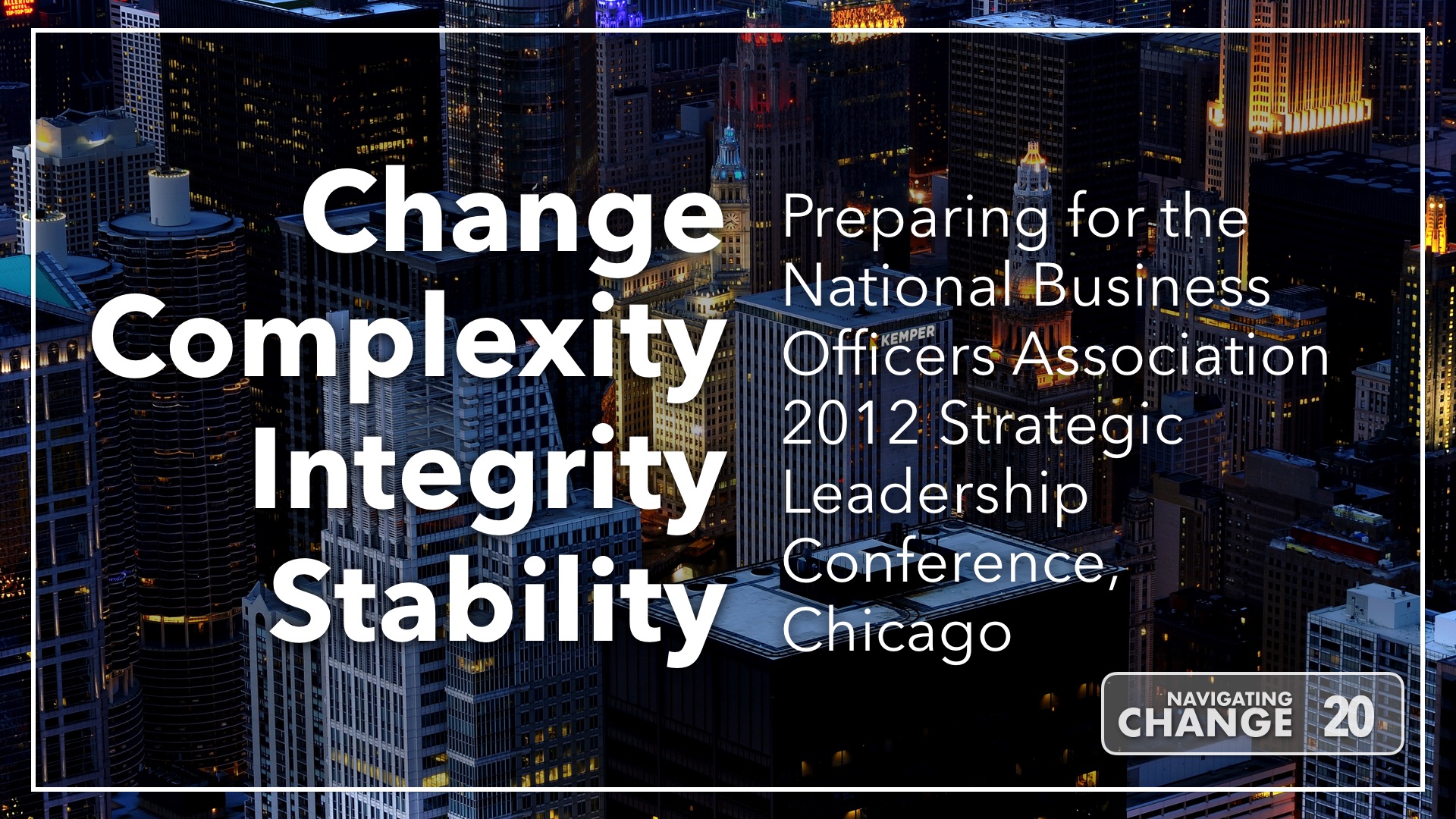20: Change, complexity, and preparing for NBOA 2012
This November, I'll be heading to Chicago for the National Business Officers Association (NBOA) 2012 Strategic Leadership Conference. In brief, this is a conference dedicated to the people charged with moving our schools forward in times of great challenge and increasing complexity, with integrity and fiscal stability. I love this topic.
I'll be taking the stage twice in Chicago, both on Monday, November 5. Mark your calendars:
8:30 - 10:00 am: Change Leadership: How Change Management Impacts Real Change
1:00 - 2:30 pm: Learning How to Brainstorm and Map Organizational Process and Structures
I thought it might help to share some of the background to these topics with you in advance, to give you some insight into the kind of work I've been doing that has brought me to this place, and to the structure I'll be sharing with you. This post is the first of three to come over the next week in which I'll discuss the nature of change and the impact of on our schools. In addition, the current episode of my podcast offers a brief summary of my role at NBOA this year. I encourage you to check it out—it's only about 10 minutes long.
My perspective begins with two fairly simple observations on groups, and how groups deal with complex change.
Observation #1: It’s uncertainty—not change—that makes us crazy
It’s not change that people have an issue with—it’s uncertainty. As a leader, think about your experience delivering tough news to your teams; bad news is almost always better than uncertain news, because bad news is concrete. It opens the door for action. With uncertainty, we are hardwired to anticipate the worst. Rumblings about a new leader in our midst, financial challenges, suggestions of reorganizations—this is just the sort of news that cultivates the environment of uncertainty and sends our teams to pieces.
There are those who have learned to welcome uncertainty. They know that uncertainty is fertile ground for the seeds of new ideas. But most of us don’t have that gene, and don't feel empowered when we can’t see the end of the tunnel. Instead we fall somewhere on a spectrum that leads from shock, through denial and confusion, down the road to frustration. Empathy within this dynamic is core to our role as leaders in our organizations. Being a leader in a volatile situation or crisis is about learning to anticipate where this uncertainty will occur for our teams, steering clear of mob mentality, and facing difficult truths with clarity and confidence.
Observation #2: Innovation & Blame
When asking and tough questions of our teams and organizations risks the status quo, it’s often easier to let circumstances dictate outcomes.
We are generally troubled by innovation and the challenges that come with it in the organization. We accept the value of innovation but don’t want to be the ones to innovate. If we innovate, we get to own the success or failure that comes from it. Ownership is scary.
Even with an increasingly public discourse on tuition increases, lack of financial aid, and loss of state aid—creating a climate of indefinite instability—we’re still waiting for answers that aren't coming. That’s because the answer doesn’t lie in a box that someone else hasn’t yet opened. It lies in getting a collective perspective of administrators, faculty, alumni, students, and key stakeholders, and asking questions that uncover the problem—not just the problem as we think we understand it. The answer lies in innovation.
Because innovation is scary, it is a breeding ground for blame. Tuition shortfall? Clearly that must be a finance department issue, so we'll blame them. Enrollment is sluggish? Clearly the admissions department is not pulling its weight, they're to blame. Academics, facilities, administration—we can find reasons to saddle each with the blame for something. But our better selves know that blame is counterproductive. The sooner we find a systematic fashion for getting the very best of each group to solve our collective issues together, the sooner we will begin to craft a foundation for strength and growth.

